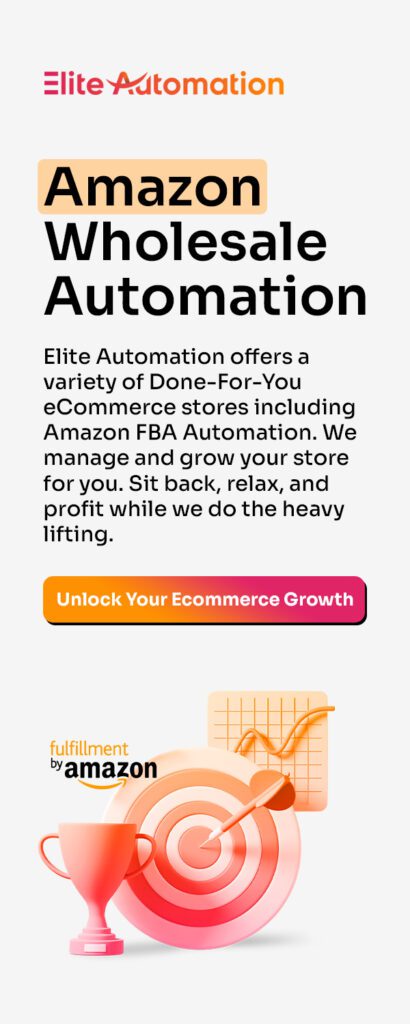Very few people think about selling their business right off the bat. Of course, you put your blood, sweat, and tears into running your online business to generate a consistent income stream.
But think about it, if you own an operational Amazon FBA business, you can sell it out for 6-7 figures a few years down the road, potentially.
You do not necessarily need to focus on selling it. However, you shouldn’t forget the value attached to your digital asset – your Amazon FBA business.
When building an Amazon FBA store, you aren’t only working to receive bi-weekly passive income; instead, you are growing an asset that can provide you a hefty amount when needed.
So, knowing the resale value of your store and understanding tips on preparing it for sale can be incredibly beneficial.

How to Calculate the Resale Value of Amazon FBA Business
There are two primary ways to calculate the resale value of your business: net profit and sales multiples.
Both factors determine your business’ resale value because they depict how much income it can generate in the future based on how it has performed in the past. The more money your store can make, the higher its value – that’s not always the case, however.
The key is to take a year’s average net profit and determine the drop and surge in the earnings.
To begin with, assign your business a multiple. The figure is calculated on several factors, including the number of products your business sells, its age, risk factor, TTM revenue, average monthly net profits, and its model. You can then multiply the multiple with a year’s average net profit. Here’s a quick formula:
- Net profit x Multiple = Valuation
Why Build An Amazon FBA Store to Sell?
There are multiple advantages to building your store for selling. When you prepare from scratch, it avoids unnecessary hassles and keeps the processes smooth. Here’s how else it benefits you:
- Preparing your business beforehand helps streamline processes because you have everything in order, including your processes and systems.
- You’ll have solid data to show to the prospects and let them see how your store is performing.
- Preparing to sell automates processes and lets you scale the business more efficiently. Standard Operating Procedures (SOPs) are typically requested upon the sale.
- It also helps you identify weak spots in your business and areas for improvement.
- You will gain an understanding of all your business assets in addition to the income-producing storefront (for example, a customer’s lifetime value, email lists, social media accounts, etc.)
Prospects could be willing to pay a hefty amount for your store, so they want assurance they’re investing in a valuable asset. They want to see you implement systems that operate effectively and analytics that depict your business’ profitability.

Tips to Prepare Your Business for Selling
Preparing yourself for your store sale will help you increase the potential profit. So, whether you own a small business or a large store, you must follow a few steps to lay the groundwork for selling your business.
Analytics
Buyers seeking to purchase an online business see the amount of traffic it receives and the source of it. You’d need to keep track of the traffic visiting your page to provide them with accurate information.
You can use Google Analytics or other similar tools to monitor the traffic.
While analytics gives buyers an advantage, it also comes in handy for you as a business owner. It’s always better to have business-related data than not having one.
It lets you measure your business’ performance history. The testing helps you improve for the better by increasing your conversion rates.
Further, you can also keep the spam traffic in check with analytics. This way, you can spot the genuine traffic that actually contributes to your business growth.
Finances
Potential buyers also want crisp, organized, and easy-to-comprehend information about the business’ finances. Therefore, you should ensure you’re not using the same account to manage your business and personal expenses!
It is an ineffective way to handle your business. Plus, it’s also a nightmare for the buyer trying to evaluate your business.
They want proof of your revenue to vet your business value. So, they’ll naturally question your gross margin, monthly revenue, and cost of sold products.
They desire to know how much money you spend on acquiring customers and overhead. This helps them assess a business’ worth and whether they’re making the right decision.
Putting your finances in order also helps you see how much money you generate from your business. Not only does it help you monitor the profits, but it also allows you to stay abreast of the taxes to better determine your store’s value.

Develop Systems
A Standard Operating Procedure (SOP) gives an in-depth manual for various aspects of your business.
You can pen down how you’ll tackle different tasks, including keyword research, product selection, writing product descriptions, content creation, optimization, and more.
Consider starting with a simple task and shifting to more complicated tasks.
Ideally, buyers seek to invest in businesses that require minimal effort so they can sit back and see the cheques roll in. When you leave the majority of the work to the business owners, it makes your business less attractive.
Creating SOPs, however, resolves the problem.
Standard Operating Procedures are so important in business because they help to create a predictable, consistent experience for customers and employees. When every employee knows exactly what to do and when, it’s easier to manage a company’s resources, especially when it comes to training new employees.
It also allows employees to focus on the task at hand rather than worrying about whether or not they’re doing something correctly. When transitioning the FBA store to a new buyer, it’s imperative to have clean SOPs in place.
The Best Time to Sell Your Business
The best time to sell largely depends on what you’re trying to achieve. Do you want to utilize the money to pay the mortgage or want to start another business?
Will a five-figure sale help you meet your goals, or do you need to achieve 6-7 figures before exiting?
Knowing your end goal helps determine the best time for selling your business. You can always calculate the sale price by using the valuation formula. It includes two primary factors:
- The average monthly net profit over 12 months
- Sales multiple
- Sometimes, valuations are determined by TTM (trailing twelve months revenue).
Also, regardless of your store category, it has the potential to sell at an incredible price – so long as you put in the effort.
You can check out the Empire Flippers Marketplace to see the categories of stores listed for sale. You’ll find many Amazon FBA stores for sale as well as other e-commerce stores listed for a variety of multiples.

Conclusion
Selling your business is one of the biggest decisions of your life. However, not all entrepreneurs start their business with the mindset of selling it. Therefore, they restrain from taking the essential steps to optimize their business for a future sale.
Life is unpredictable, and you may plan to sell your business down the road. Putting your business up for sale doesn’t always indicate a business dip or life crisis.
It’s not always easy to know when it’s time to part ways with something that you’ve worked hard to build. But as much as you might love your business, sometimes it’s just not the right fit anymore and moving on is the best option. Here are some common reasons people choose to sell their business:
- They want more time for themselves and their family.
- They want more money in their bank account.
- They want to retire early or travel more often.
- They need extra cash to purchase a home or initiate a remodel or renovation.
All in all, the sale of an e-commerce store may help you meet your long-term financial goals. Hence, preparing your business for sale from the beginning boosts the potential of selling it at a higher price – and more quickly.

